Dutch pronunciation: [jɑnˈɦeːmskɛr(ə)kˈaːbraːɦɑmˌsoːn] ; 30 July 1818 – 9 October 1897) was a Dutch politician who served as Chairman of the Council of Ministers from 1874 to 1877, and again from 1883 to 1888. His son, Theo Heemskerk also served as Chairman of the Council of Ministers.
Contents
Biography

Jan Heemskerk Abrahamszoon was born on 30 July 1818 in Amsterdam. He was the son of Abraham Heemskerk and Joanna Jacoba Stuart. [1] He was baptized on 27 August 1818 in the Remonstrant Church in Amsterdam. [2]
He studied law and became a lawyer, then a member of the House of Representatives. Originally a liberal politician, he became a conservative in 1866, and remained this in his Premiership.
He was three times Ministers of the Interior (1866–1868; 1874–1877; 1883–1888) and three times temporary chairman of the Council of Ministers, similar to the present-day Prime Minister, (1867–1868; 1874–1877; 1883–1888). He was Minister of State from 1885 to his death. [1]
Heemskerk died on 9 October 1897, at the age of 79, in The Hague. [1]
Personal life
Heemskerk married his first cousin Anna Maria Heemskerk on 1 October 1846 in Utrecht. They had 5 sons, one of whom died in infancy, and 3 daughters. [1] His son Theo Heemskerk (1852–1932) was Chairman of the Council of Ministers from 1908 to 1913. [3] His son Jan Frederik Heemskerk (1867–1944) was a member of the House of Representatives. [4]
Published works
Heemskerk's published works include
- De praktijk onzer grondwet. 2 vols. (Utrecht: J. L. Beijers, 1881.)
- Speciminis inauguralis de Montesquivio pars prior [-altera]. 2 vols. (Amstelodami: J.H. et G. van Heteren, 1839.)
Related Research Articles

General elections were held in the Netherlands on 6 March 1888, with a second round in 25 constituencies on 20 March. The Liberal Union emerged as the largest party, winning 46 of the 100 seats in the House of Representatives.

General elections were held in the Netherlands on 10 April 1894, with a second round in 27 constituencies on 24 April. The Liberal Union and the dissident Free Liberals remained the largest group, winning 60 of the 100 seats in the House of Representatives.
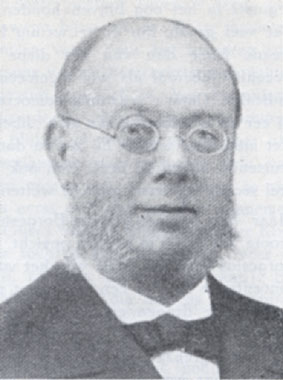
Nicolaas Gerard Pierson was a Dutch economist and Liberal statesman who served as the chairman of the Council of Ministers of the Netherlands from 1897 until 1901.
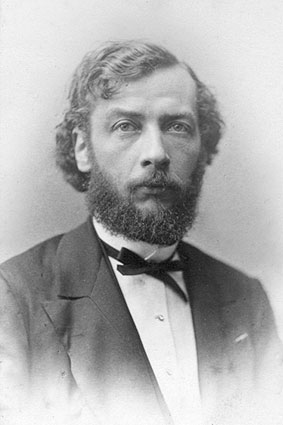
Gijsbert van Tienhoven was a liberal Dutch politician. He started his political career in the municipal council and executive of Amsterdam, and served as mayor of Amsterdam from 1880 to 1891. He spent one year in the House of Representatives and eleven years in the Senate before being appointed formateur after the 1891 general election. For three years, he served as Prime Minister of the Netherlands and Minister of Foreign Affairs before his cabinet fell in 1894. He also served as Queen's Commissioner of North Holland for fourteen years, between 1897 and 1911.

JonkheerJoan Röell was a Dutch nobleman, lawyer and statesman. He was a member of a prominent Dutch noble family which produced many public administrators, and politicians.

Samuel van Houten was a Dutch liberal politician, who served as Minister of the Interior from 1894 to 1897.
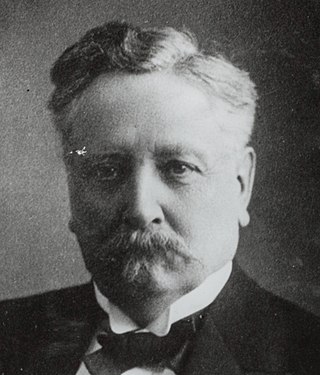
Theodorus Heemskerk was a Dutch politician of the Anti-Revolutionary Party (ARP) who served as Chairman of the Council of Ministers from 12 February 1908 until 29 August 1913.
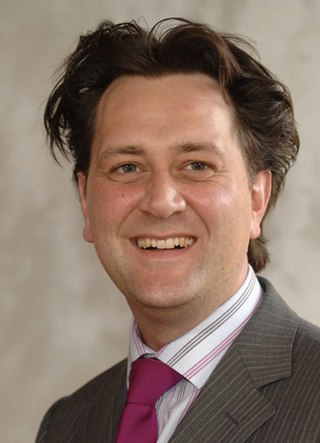
Frank Heemskerk is a former Dutch politician. He was member of Parliament for the Labour Party between 2003 and 2006 and was Minister for Foreign Trade within the Ministry of Economic Affairs from 2006 till 2010.

Floris Adriaan van Hall, Baron of Hall was a nobleman and statesman from the Netherlands in the 19th century. He played an important role as representative of the Amsterdam trade and banking sector, and later as politician. He served as Prime Minister of the Netherlands from 1853 to 1856, and again from 1860 to 1861.
Æneas, Baron Mackay was a Dutch Anti-Revolutionary politician who served as Chairman of the Council of Ministers from 1888 to 1891. Born into a noble family from Gelderland, he studied law in Utrecht and worked as lawyer and a judge. He was elected into the House of Representatives in 1876, and retained his seat for twelve years before his premiership. In his cabinet, he served as minister of the Interior and minister of Colonial Affairs. After another thirteen years in the House, he became a member of the Council of State, receiving the honorary title Minister of State.
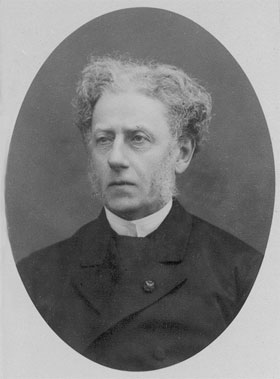
Constantijn Theodoor, Count van Lynden van Sandenburg, was a Dutch politician. Van Lynden van Sandenburg served as Chairman of the Council of Ministers of the Netherlands between 1879 and 1883.

Pieter Philip van Bosse was a Dutch liberal politician. Serving as minister of Finance in six cabinets throughout the middle of the 19th century, Van Bosse led many reforms that liberalised the Dutch economy. He led a cabinet himself as Prime Minister of the Netherlands from 4 June 1868 to 4 January 1871.

Schelto, Baron van Heemstra was a Dutch politician. He was Prime Minister from 1861 to 1862.

Gert Jan Maarten "Gert-Jan" Segers is a Dutch politician who was Leader of the Christian Union between 2015 and 2023. He has been a member of the House of Representatives between 2012 and 2023 and was parliamentary leader between 2015 and 2023.

The Jan Heemskerk cabinet was the cabinet of the Netherlands from 23 April 1883 until 21 April 1888. The cabinet was formed by Independent Conservatives, Independent Liberals and Independent Catholics after the election of 1883. The right-wing cabinet was a majority government in the House of Representatives. Independent Liberal Conservative Jan Heemskerk was Prime Minister.

The Heemskerk–Van Lynden van Sandenburg cabinet was the cabinet of the Netherlands from 27 August 1873 until 3 November 1877. The cabinet was formed by Independent Conservatives and Independent Liberals after the election of 1873. The right-wing cabinet was a majority government in the House of Representatives. Independent Liberal Conservative Jan Heemskerk was Prime Minister.
References
- 1 2 3 4 (in Dutch) Mr.Dr. J. (Jan) Heemskerk Azn., Parlement & Politiek. Retrieved on 7 March 2015.
- ↑ "Inventarissen".
- ↑ (in Dutch) Mr. Th. (Theo) Heemskerk, Parlement & Politiek. Retrieved on 7 March 2015.
- ↑ (in Dutch) J.F. (Jan) Heemskerk, Parlement & Politiek. Retrieved on 7 March 2015.
External links
-
 Media related to Jan Heemskerk at Wikimedia Commons
Media related to Jan Heemskerk at Wikimedia Commons
Jan Heemskerk | |
|---|---|
 Portrait by Johan Heinrich Neuman, 1896 | |
| Chairman of the Council of Ministers | |
| In office 23 April 1883 –20 April 1888 |
